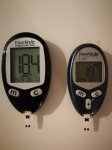This explains it better than I can:
Most meters come with a vial of test solution, which is fake blood with a set amount of sugar in it. You can use the test solution to make sure your meter is working within the normal operating range. You simply take a test just like you would test your blood sugar, but instead of lancing you finger and testing your blood, you put a drop of test solution on the tip of your finger and test it.
Each vial of test strips will have a range of expected results printed on it. So long as the test you took falls within those numbers, the meter is working normally.
One important note, however, is that about half the meters available need to be coded to match each batch of test strips. This may be done with a chip that comes with the strips and needs to be plugged into the side of the meter, or by using the key pad on the meter to enter a one- or two-digit number that is printed on the vial of strips.
Many newer meters are “self coding,” but if you have a meter that requires coding and it is not properly coded, it can be off by as much as 80 percent.



 is it going to come down more...we shall see lol
is it going to come down more...we shall see lol


